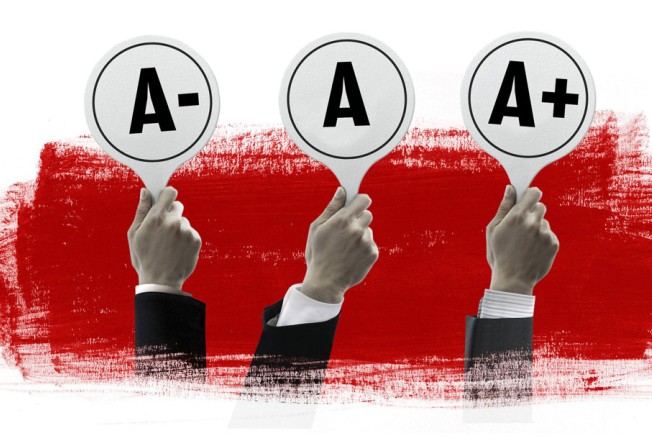
It's all investment grade in China
Ninety-six per cent of ratings issued by domestic credit agencies are at AA or above, leaving investors little range to assess a company's worth

The mainland’s ratings agencies do not differentiate – 96 per cent of domestic ratings are AA or above.
According to the three dominant domestic agencies – Chengxin, Lianhe and Dagong, which collectively control 80 per cent of the domestic market – all mainland credits exist in a tight, four-notch cluster veering between “extremely strong” creditworthiness and the merely “very strong” (to use Chengxin’s language describing AAA and AA ratings).

This is a problem for offshore funds that are entering China’s domestic debt market, thanks to the opening up of the RQFII (renminbi qualified foreign institutional investor) scheme. There has been 167.8 billion yuan (HK$214 billion) of quota allocated to 57 institutions since the scheme’s launch in 2012, and a new fund dedicated to domestic mainland debt to be launched in Hong Kong each month.
RQFII just scratches the surface. China’s bond market is growing rapidly. It has grown from a very low base in the past decade to become the world’s fourth-largest, with more than US$4 trillion outstanding in the domestic market alone. It is projected to eclipse the US market by next year.
However, the agencies rating this huge volume of issuance that alert investors to what is investment grade and what is not, provide a unified view of this market – everything is supremely investment grade.
The domestic agencies offer varying reasons why this is so.
Philip Lee, the Hong Kong-based managing director of Chengxin’s international rating operations, said the rating agencies were launched to develop China’s bond market, to help wean firms off their historic reliance on bank debt.
Chengxin, China’s first rating agency, was launched with support from the International Finance Corp, an arm of the World Bank, with the specific task of upgrading China’s debt market.
Chengxin is 49 per cent owned by Moody’s. However, if Chengxin applied the same ratings scale used by Moody’s internationally, a lot of mainland debt would look low grade, deterring investors.
“It would make it very difficult for the market to develop,” Lee said. “Having a different set of credit rating symbols for the domestic market of an emerging economy in effect is to help develop the domestic market.”
Kwong Li, Lianhe’s Beijing-based chief executive, said his firm used methods similar to those used by its 49 per cent owner, Fitch.
He said the difference was that on the international scale, the company was being compared to firms around the world, whereas the domestic measure just looked at which were the best firms in China.
There are large incentives to push up the domestic ratings. Banks and insurance firms buy most of the bonds issued in the mainland market, and these institutions can only buy securities rated AA-minus or above.
Securities also needed to be rated AA or above by local rating agencies to be eligible for repurchase agreements in China’s exchange market, said Ping Chew, Standard & Poor’s head of Greater China.
Simply put, if a bond is rated below AA-minus, it will not have much use for the core investor base buying the securities – banks and insurance firms.
There is one persuasive argument supporting the agencies’ high ratings: Chinese issuers have never defaulted on a mainland bond. In every case the government orchestrated a rescue, often in co-ordination with a state-owned bank.
Chew said municipal governments would often step in when an issuer was on the brink of default to prevent a liquidation of the firm and the loss of local jobs.
As the bond market’s biggest investors, banks also have a financial incentive. If an issuer defaulted on a bond. a bank would be forced to write off its investment.
However, if the same bank lends that firm money to stay current on its bond investments, no write-down is required.
“If the bond defaults, there’s a public record. If a bank lends to pay off a bond, there is no public record,” Chew said.
The implicit support of the mainland government and banks have until now ruled out the possibility of any domestic default by a Chinese bond issuer.
The domestic rating agencies have always been more attuned than the international agencies to the concept of implied sovereign support, and it may be that the domestic agencies have this one right.
Of course, if one takes the view that default is impossible in the mainland market, one might ask what purpose the rating agencies serve.
An investor does need an independent view on the creditworthiness of all mainland issuers if all bonds are backed by a single credit: the People’s Republic of China.
There is an ever larger question. If authorities will not allow defaults, then domestic bonds are not functioning as a true capital market – so why have a bond market at all?
For such reasons, people at the domestic rating agencies quietly hope that the government will, in fact, start allowing defaults sporadically, to begin a process of true credit differentiation.
“A lot of commentators in China say there will be a default of an SOE, or maybe even a small bank,” Lee said. “This is very good, this means the regulators of the market will stratify the credits of different companies, and then the rating agencies and investors will have to rely more on their own analysis.”
